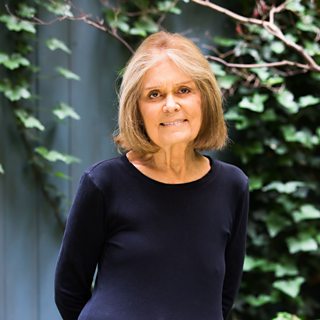Gloria Steinem: Seven things we learned when she spoke to Kirsty Young
In her Βι¶ΉΤΌΕΔ Radio 4 podcast Young Again, journalist and broadcaster Kirsty Young asks fascinating people what advice they would like to give their younger self.
Gloria Steinem is one of the most important figures in feminist history. An activist and writer, she’s spent decades advocating for the rights of women. Now aged 90, she looks back on her life and tells Kirsty about her struggles, triumphs, and why she thinks laughter is a person’s most valuable tool. Here are seven things we learned.
-
![]()
Young Again: Listen to this episode on Βι¶ΉΤΌΕΔ Sounds
Young Again: What advice would Gloria Steinem give to her younger self?

1. She knew her childhood wasn’t normal
“I’m not sure I ever thought that what was going on in my own family was normal for anybody else’s family,” says Gloria. She grew up in America in the 1930s and 40s, in a family that challenged the norm in all sorts of ways. “I was not going to school, because my father had a summer resort, and in the winter he’d put us all in a house trailer and we voyaged to California and Florida, buying and selling antiques,” she says.
I was wearing a costume that it was probably not legal to require of a waitress.Gloria on her time undercover at the Playboy Club
Her parents divorced in the 1940s, which was highly unusual for the time. After her mother had a debilitating mental health breakdown, Gloria became her carer. “There are many people in the world who grew up as children looking after their parents…and it caused us to grow up too early, but we’ve all had difficult times in our lives.” As in every aspect of her life she discusses, she looks at the positives. “It made me look forward to a time when I would be on my own and responsible only for myself.”
2. She found going undercover as a Playboy bunny awful
Gloria became a journalist in the early 1960s and gained huge renown for an Esquire magazine article about going undercover as a “bunny” at the Playboy Club. She describes working at the club as “awful” and adds, “It was very much a men’s club, so there was a lot of mild sexual – not exactly assault, but supposition.”
She says the club had some likely unlawful practices with regard to its employees. “I was wearing a costume that it was probably not legal to require of a waitress,” she says. “The Playboy Club had a kind of racial system… the Black women had to call themselves ‘chocolate bunnies’… And one more thing was that we were told we had to have an internal exam to serve food in New York State, if you can imagine that. So they sent us all to some doctor… who was paid, I guess, by the Playboy Club. That was, of course, completely illegal too. That was a good introduction to the fact that what I assumed were illegal practices were not rare.”
3. Being 90 feels astonishing
Steinem turned 90 in March, 2024. She describes the feeling of being 90 as “astonishing. I have no idea how I got here.” She laughs. “I went online and tried to research the oldest woman in the world, so I would have a goal. I found a woman in the Himalayas who at least says she’s 130, so I have another goal. I mean, I love it here. I don’t want to leave.”

4. She’s furious about the rolling back of abortion rights
In 1957, Steinem had an abortion. She has talked about that, and her belief in everyone’s choice to do the same, for decades, in her effort to improve women’s rights. She says she never found it difficult to speak up, because she was surrounded by women doing the same. “We were part of a wave of change, so we always knew that although it wasn’t conventional we also weren’t alone.”
She says the 2022 overturning of Roe v. Wade, a U.S. legal case that protected women’s right to abortion, felt personal. “Why should our bodies be under the regulation of the government? Men’s bodies are not… Decisions over our own bodies should be ours alone, unless we are a threat to other people.”
5. She’s not interested in being an icon
“I don’t think I want to be an icon,” says Gloria when Kirsty brings up the word. “An icon’s a kind of thing, isn’t it? I don’t think about [myself] in that way.” She doesn’t see any value in placing herself above other people. “It just doesn’t occur to me. For one thing, if I’m imposing my will on the people around me, I’m probably not listening or learning. So it seems to me that I’m depriving myself of whatever I might learn by being a more equal participant and listening.”
6. Laughter is the greatest power
“I hope that we understand that [activism] is fun,” says Gloria when discussing her decades of protest and what keeps her going. “It’s interesting and it’s not a difficult duty. It’s a part of life. I mean, this moment will never arrive again, so why not take advantage of it?”
Asked the most significant lesson she’s learned in all her years of activism, she says, “Laughing… First of all, [laughter] is the only emotion that can’t be controlled. You can force somebody to conform, take orders, do all kinds of things, but you can’t force them to laugh. Our Native American cultures have a god of laughter, because it is truth and spontaneity and comes from within. As a culture, they’re wise enough to value laughter. I hope we can do that more.”
7. She’d like her legacy to be people celebrating uniqueness
Gloria isn’t entirely comfortable with the idea of having a legacy, but after a life dedicated largely to the betterment of other people, she says, “I would hope that whatever my legacy is – which I think I don’t know and can’t dictate – is that it might help individual people, whatever their gender, race, class or whatever, to become more the unique, valuable, loved and loveable person that they want to be.”






